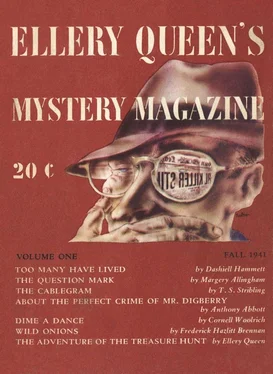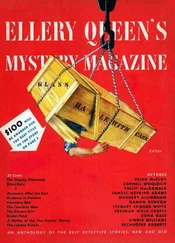Марджери Аллингем - Ellery Queen’s Mystery Magazine. Vol. 1, Fall 1941
Здесь есть возможность читать онлайн «Марджери Аллингем - Ellery Queen’s Mystery Magazine. Vol. 1, Fall 1941» весь текст электронной книги совершенно бесплатно (целиком полную версию без сокращений). В некоторых случаях можно слушать аудио, скачать через торрент в формате fb2 и присутствует краткое содержание. Город: New York, Год выпуска: 1941, Издательство: American Mercury, Жанр: Классический детектив, на английском языке. Описание произведения, (предисловие) а так же отзывы посетителей доступны на портале библиотеки ЛибКат.
- Название:Ellery Queen’s Mystery Magazine. Vol. 1, Fall 1941
- Автор:
- Издательство:American Mercury
- Жанр:
- Год:1941
- Город:New York
- ISBN:нет данных
- Рейтинг книги:5 / 5. Голосов: 1
-
Избранное:Добавить в избранное
- Отзывы:
-
Ваша оценка:
- 100
- 1
- 2
- 3
- 4
- 5
Ellery Queen’s Mystery Magazine. Vol. 1, Fall 1941: краткое содержание, описание и аннотация
Предлагаем к чтению аннотацию, описание, краткое содержание или предисловие (зависит от того, что написал сам автор книги «Ellery Queen’s Mystery Magazine. Vol. 1, Fall 1941»). Если вы не нашли необходимую информацию о книге — напишите в комментариях, мы постараемся отыскать её.
Ellery Queen’s Mystery Magazine. Vol. 1, Fall 1941 — читать онлайн бесплатно полную книгу (весь текст) целиком
Ниже представлен текст книги, разбитый по страницам. Система сохранения места последней прочитанной страницы, позволяет с удобством читать онлайн бесплатно книгу «Ellery Queen’s Mystery Magazine. Vol. 1, Fall 1941», без необходимости каждый раз заново искать на чём Вы остановились. Поставьте закладку, и сможете в любой момент перейти на страницу, на которой закончили чтение.
Интервал:
Закладка:
Campion lit a cigarette and his eyes were thoughtful.
“Oh, our Herbert is honest,” he said. “Herbert’s as honest as the day. You’re sure you can identify the stuff?”
“Certain.” Oates glanced toward the battered suitcase on the table in the corner. “There’s no doubt of that. You heard what Inspector Baker said. He’s working on the case. He’s seen photographs and studied descriptions. Besides, my dear chap, it’s all there. That’s the proceeds of the Question Mark’s Manchester Square haul all right; no doubt about it. We’ll check up on the cloakroom attendant and the girl at the cleaners’, and if these are okay we’ll have to interview Sir Matthew. There’s no other way out. We must find out where that ticket came from. He’ll be able to give us an explanation all right, but we must have it.”
Campion thrust his hands into his pockets and his lean face was troubled.
“That’s going to be infernally awkward, isn’t it?” he ventured. “You’ll have to drag in Herbert to protect yourselves and he’ll have to mention Miss Pleyell to protect himself.”
Oates, one of the kindest and most sympathetic of men, spread out his stubby fingers in a gesture of regret.
“He’s a lawyer,” he said. “Her name will come out in the end. You can’t suppress it. She’s asked for it, you know.”
Campion nodded. “Still, it seems a pity she should get it,” he said and grimaced. “Sir Matthew’s obviously not the Question Mark himself and it’s a pity to drag him into it. He’ll never forgive her. He’s not that type.”
The superintendent did not smile.
“I know, I know, my lad,” he said. “You needn’t tell me. I’d like to do all I could for the girl. Indirectly she’s put us on to a very important thing. But what other course is open to me? I ask you.”
The tall young man in the horn-rimmed spectacles was silent for some moments. The vague idea which had come to him on the previous afternoon when Mr. Florian had been talking to Chloe, and which had been knocking at intervals on the door of his mind ever since, suddenly presented itself as a concrete thing. He looked up.
“What was the number of the ticket for the suit?” he demanded.
“The cloakroom ticket?”
“No, that was for the suitcase. What was the number of the cleaners’ ticket that Tuke gave Herbert when he sent him down to claim Sir Matthew’s dinner jacket?”
Oates regarded him silently.
“Wait a minute,” he said at last. “I’ve got it here. Boot got it from the girl and gave her a receipt instead. He’s a cautious lad, is Herbert. I rather like him. Here you are — one hundred and sixty-one.”
He pushed over a small square of magenta paper on which the figures were roughly printed beneath a single line of very small type announcing the Birch Road Quick Cleaning Co’y. Campion folded the heading over carefully and turned the slip round before he gave it back.
“How about that, if a girl was in a hurry?” he enquired.
The superintendent’s heavy eyebrows rose as he stared at it.
“That’s an idea,” he said cautiously. “A genuine idea. You get ’em, don’t you?”
Campion leaned over the desk.
“Come down yourself to the cleaners’ with me now and bring the wallet,” he said. “I’ve got an idea.”
“Another?”
“I think so. It’s a notion which has been fidgeting me all day. There’s just a chance I may be on to the man you want. Those two descriptions of the Question Mark which you had, one from a postman in the Clarges Street show and one from the nurse in the earlier business, both agreed that he was a stooping, sinister figure, didn’t they?”
“Yes, but the other woman who saw him running said he straightened up when he was on the move,” Oates objected.
“Ah, but she saw him from above,” said Mr. Campion. “Will you come down to the cleaners’ with me?”
The superintendent rose, grumbling.
“I don’t mind you working yourself to death for your friends,” he said, “but I resent it when I’m expected to do the same. She’s pretty, this Miss Pleyell, I suppose?”
“Exquisite.”
Oates sighed. “That’s a comfort,” he said. “If she was only crackers, I should loathe this. Come on, we’ll take Herbert and a sergeant. I hope you have got something up your sleeve.”
“So do I,” murmured Mr. Campion fervently. “I should hate to have to take back that epergne.”
The Birch Road Quick Cleaning Company’s establishment was not a large affair. It was situated in a back street some way behind the magnificent block in which Sir Matthew Pearing had his super-flat. Herbert and the sergeant remained in the taxicab some little distance down the road, while Campion and the superintendent interviewed the harassed but by no means unintelligent young woman in charge.
She left the steaming press in the window and listened carefully to their questions.
She remembered Herbert perfectly, which was not unnatural since he had taken so much care that she should, and readily produced his receipt for the suit and the wallet. Moreover, she remembered Mr. Tuke, who was a regular customer, bringing in the dinner jacket on the previous evening. She also identified her own official ticket.
“One hundred and sixty-one,” she said. “I remember it.”
Campion turned the magenta slip round.
“How about one hundred and ninety-one? It’s an easy slip if you look at it quickly,” he suggested.
She glanced up at him with shrewd cockney eyes.
“It could ’ave ’appened,” she admitted. “But it didn’t. I remember the suit. See? The suit I give the gentleman who gave me the receipt was the suit I took from Mr. Tuke.”
“Very likely, miss.” Oates beamed upon her in his most avuncular fashion. “But that’s not the point. It’s the wallet we’re interested in. What happens when something is left in the pocket of a coat which comes in to be cleaned?”
The girl’s face cleared.
“That’s about it,” she said suddenly. “Just a minute.”
As she crossed the shop to the inner room, Oates glanced at Campion.
“She’s sharp,” he said. “We’re lucky.”
“George,” shouted the girl, “come here, will you?”
A tall, thin man, clad in bedraggled trousers and a singlet, came out of the steam chamber, wiping his face and arms with a towel.
“This is my brother George,” the girl explained. “He does the suits. He’d know what you want.”
George stared at the black wallet which the superintendent showed him for some little time before he committed himself.
“That’s right,” he said at last. “I found it in an inside pocket in a waistcoat. It was very nearly empty when I saw it — a couple of stamps and a ticket.”
“That’s right. It’s of no value. But what did you do with it?”
“Put it in here, like I always do when I come across things.”
George pulled open a drawer in the cash desk, where several odds and ends were stacked neatly, each with a slip of paper attached.
“See?” he said. “I lay the article in here and I write the number of the suit I took it from on a bit of paper and lay it on top of the thing. When Sis gives the clothes back, she just matches the numbers and returns the property.”
Campion sighed with relief.
“Then it would have been possible to mistake the number one-six-one for one-nine-one, for instance?”
George hesitated. “It might,” he said. “I’ll tell you one thing, if it’s any help to you. I took that wallet from the inside waistcoat pocket of a brown tweed suit. I remember it distinctly — a brown tweed suit. What the number was I can’t say.”
The girl pounced on the ledger and ran her finger down a column of hieroglyphics.
Читать дальшеИнтервал:
Закладка:
Похожие книги на «Ellery Queen’s Mystery Magazine. Vol. 1, Fall 1941»
Представляем Вашему вниманию похожие книги на «Ellery Queen’s Mystery Magazine. Vol. 1, Fall 1941» списком для выбора. Мы отобрали схожую по названию и смыслу литературу в надежде предоставить читателям больше вариантов отыскать новые, интересные, ещё непрочитанные произведения.
Обсуждение, отзывы о книге «Ellery Queen’s Mystery Magazine. Vol. 1, Fall 1941» и просто собственные мнения читателей. Оставьте ваши комментарии, напишите, что Вы думаете о произведении, его смысле или главных героях. Укажите что конкретно понравилось, а что нет, и почему Вы так считаете.












